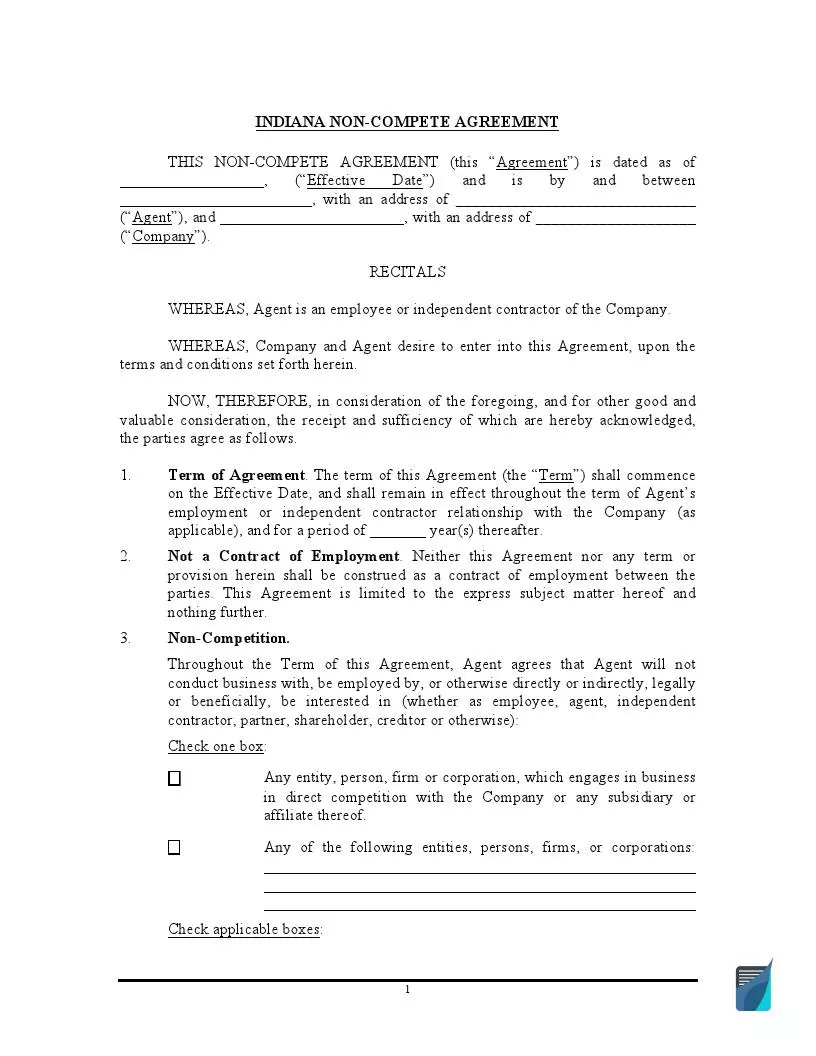Indiana Non-compete Agreement Template
In the United States, it is common to sign non-compete agreements. The state of Indiana is not an exception. A non-compete agreement is a legal document that prevents American employees from working for a competitor company or starting a business in a similar area (sometimes after being let go by a former employer). This non-compete agreement example used to be signed only by chief executive officers or top executives. However, nowadays, the number of employees who sign this document is increasing.
Knowledge and skills are as mobile as job positions are. Thus, a business company is likely to protect its confidential information from leaking and keep itself away from trade secret fraudsters, i.e. the theft or unauthorized revealing of a confidential plan, idea, or formulae that could benefit a third party. To avoid penalties, a worker who signs the agreement must meet all the obligations written in the non-compete form. The employer whose rules have been violated has a right to litigate a legal case.

Build Your Document
Answer a few simple questions to make your document in minutes
Save and Print
Save progress and finish on any device, download and print anytime
Sign and Use
Your valid, lawyer-approved document is ready
There are a lot of types of information that fall under the category of “sensitive information,” so the list provided below is not exhaustive but includes the main details and data that an employee is normally prohibited from revealing to the public under the terms of a non-compete agreement:
- customer database (personal details, buying habits)
- the company’s inventions
- information related to unique products
- business plans
- computer programs and software
- business methods and approaches applied by the company
- results of the company’s experiments and researches
- financial information
- business reports
- suppliers’ personal information, etc.
The two parties normally discuss the full list of restrictions before generating and signing the document.
Non-compete agreements in all states, including Indiana, have a similar structure and contain the following sections.
The Parties’ Information
Typically, it includes the names of the company and the recipient (also referred to as “parties”) written at the beginning of the document and their signatures at the bottom of the last page.
Non-Compete Agreement Terms
In this part of the document, which is the most extensive, the employer must specify what rights the worker should give up, what information is considered confidential, the period for which the worker should obey the rules outlined in the paper, and when it comes into effect. Usually, the agreement comes into effect on the date of signing or after the end of the worker’s employment in the company.
Permitted Disclosure
The employer can indicate situations in which they can reveal specific information.
Release of Liability
The employer is allowed to express their wishes concerning the possibility of terminating the agreement. If the company agrees to accept any monetary amount for it, the sum should be specified in the contract (in US dollars).
Before signing a non-compete form, it’s always a great idea to negotiate the terms with your employer as you should know what rights are at stake before you and ensure that the terms are adequate.
Popular Local NCA Forms
When the relationship between an employee and employer concludes, the second might want the former to sign a non-compete, also called “covenant no to compete (CNC),” to keep their confidential information from being being exposed to their competition. Here are the state-level NCA forms our users read about the most.
Indiana NCA Laws and Restrictions
There are no statutes in the state of Indiana with regard to non-compete agreements. Court’s dislike is accounted for because such documents can violate an individual’s right to work and earn a living. However, Indiana courts allow employers to generate non-compete contracts if their interests are legitimate and their restrictions are reasonable in:
- Geography. It depends on the type of activity. If the company serves customers in different states, the worker cannot start a business associated with the one where they were employed.
- Usually, non-compete contracts are considered reasonable if they last for a period of one to two years. However, when it comes to the sale of a business, the time span can be extended to five years.
- A non-compete is reasonable only if it prohibits an employee from working, hiring coworkers, and starting a business in a similar area.
Thus, entering into such a contract will be your own choice. Before you place your signature, consult with your lawyer and let them read the agreement.
Finally, keep the copies of the document in a place where you can easily find them as you might need to refresh your memory concerning the things you agreed to before applying for a new job. Reviewing the terms of the agreement may help you avoid confusing situations with your new employer.

Listed here are other Indiana forms downloaded by FormsPal users. Try out our step-by-step builder to customize these forms to your preferences.
Other NCA Forms by State
